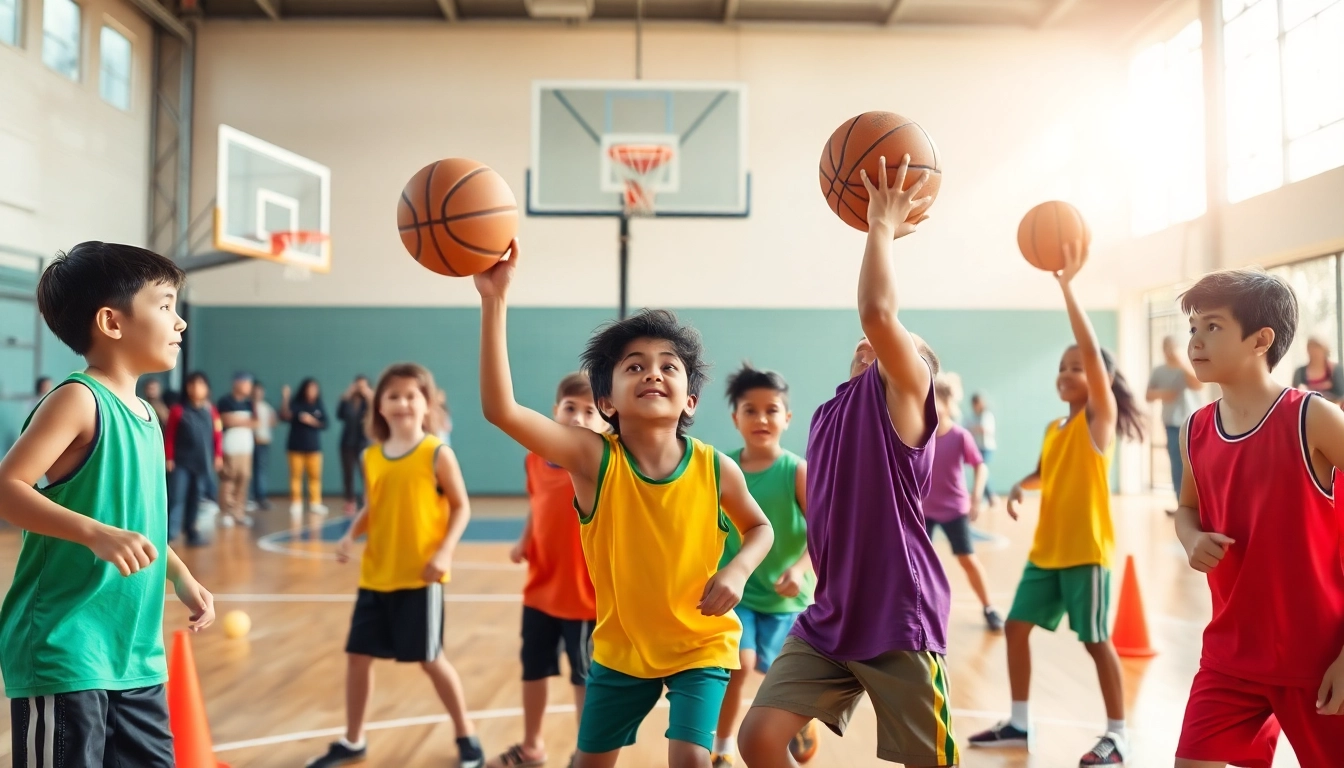Understanding the Journey of Young Basketball Enthusiasts
The world of basketball is a vibrant realm filled with passion, competition, and motivation. For young basketball enthusiasts, this sport represents not just a form of exercise but also an avenue for personal growth and development. Whether they are dribbling their first basketball or perfecting their jump shot, these young players embark on a journey marked by both triumphs and challenges.
What Drives Their Passion for Basketball?
Many factors contribute to the passion young players have for basketball. At its core, the love of the game often stems from the excitement of competition. From the thrilling atmosphere of a packed gym on game nights to the heart-pounding moments during the final seconds of a close match, basketball offers a unique blend of adrenaline and camaraderie that is hard to find elsewhere.
Beyond competition, young people are often inspired by their idols—NBA players and local legends whose extraordinary skills and stories resonate deeply with them. These role models serve as a powerful motivational force, encouraging youngsters to practice and labor with passion in hopes of one day achieving similar success.
Common Challenges Faced by Young Players
Despite the enthusiasm surrounding the sport, young basketball players often face numerous challenges. Balancing school responsibilities with the demanding practice schedules can be daunting. Moreover, the social pressures to perform, especially during tryouts or crucial games, can take a toll on their mental health.
Other common challenges include dealing with injuries, the fear of failure, and the emotional highs and lows of competition. These challenges underscore the importance of resilience, teaching young athletes that setbacks can lead to valuable lessons and ultimately stronger character.
The Importance of Community Support and Resources
Support from families, coaches, and peers plays a crucial role in the development of young basketball enthusiasts. While personal determination is essential, having a robust support network can push players through tougher times. Communities recognize this need and often provide resources such as after-school programs, mentorship opportunities, and free skill development camps.
Additionally, community engagement fosters a sense of belonging among young players. This helps to cultivate friendships and encourages teamwork, reinforcing the idea that basketball is not just an individual pursuit but a collective effort.
Essential Skills for Young Basketball Enthusiasts
To truly excel in basketball, young players must focus on mastering a variety of fundamental skills. Techniques span from basic ball handling to advanced shooting mechanics, each contributing to a player’s overall performance on the court.
Fundamental Techniques Every Player Should Master
Mastering essential skills is critical for young players hoping to take their game to the next level. Key technical skills include:
- Dribbling: The ability to control the ball while moving is fundamental. This involves developing both hands’ ball-handling capabilities and learning different dribbling styles to navigate defenses.
- Shooting: Creating a reliable jump shot is crucial for scoring points. Young athletes must practice their shooting form, balance, and follow through to ensure consistency.
- Passing: Effective passing enhances team play. Players should learn various passing techniques (chest pass, bounce pass, overhead pass) to enhance ball movement and team cooperation.
- Defense: Proper defensive techniques are crucial for stopping opponents. Young players should understand positioning, footwork, and the importance of staying low to effectively guard their counterparts.
Drills to Enhance Performance and Confidence
Intensive practices involving targeted drills can significantly enhance a young player’s proficiency. Training regimens should include drills focused on specific skills:
- Layup Drills: Consistent layup drills help players work on finishing at the rim with both hands.
- Ball-Handling Drills: Cone dribbling or using a tennis ball can improve hand-eye coordination and control.
- Shooting Cadence: Establishing a routine for shooting drills helps develop muscle memory necessary for consistent shooting.
- Conditioning Drills: Aerobic conditioning increases stamina, allowing athletes to maintain high energy levels throughout games.
How to Seek Constructive Feedback and Improvement
Constant feedback is paramount in skill development. Young players should actively seek critiques from coaches during practice and be open to video analysis. Learning to assess their performance objectively allows players to identify areas for improvement. Additionally, utilizing technology, such as basketball training apps that provide motion analysis, can give insight into their gameplay mechanics.
Inspirational Stories from Rising Stars
The narrative of overcoming adversity is a universal theme found in many great athletes. Young basketball enthusiasts resonate deeply with these stories, serving as sources of motivation and proof that dreams can indeed come true.
Stories of Young Players Who Overcame Obstacles
Countless young players have transcended challenges, embodying the tenacity required in the sport. For example, Jaden, a young athlete from a small town, once suffered a severe ankle injury that sidelined him for nearly a year. Rather than give up, he engaged in physical therapy and worked relentlessly on his rehabilitation. His spirit and resolve eventually led him to become his high school team captain, inspiring his peers along the way.
Impactful Mentorship from Coaches and Professionals
The role of a mentor cannot be overstated in a young athlete’s journey. Coaches who invest their time into the development of players not only instruct them in techniques but also impart life lessons regarding hard work and dedication. Programs such as NBA Cares exemplify this, where professional athletes mentor young players, fostering a culture of growth and inclusivity.
Lessons Learned from Basketball Icons
Learning from the greats can provide invaluable insights. Players like Michael Jordan, Kobe Bryant, and LeBron James have shared wisdom on the importance of perseverance, teamwork, and the relentless pursuit of improvement. Young basketball enthusiasts should study their journeys, noting that failure is often a stepping stone toward success.
Engaging with the Basketball Community
Basketball transcends competition; it connects individuals and communities. Engaging with local clubs and participating in community events can enhance the experience for young players.
Participating in Local Leagues and Tournaments
Local leagues and tournaments provide young athletes with structured environments to showcase their skills. These platforms not only promote healthy competition but also allow athletes to pursue their passion in a team-oriented setting. Furthermore, exposure to different teams helps players gain experience against various styles of play, fostering adaptability.
Building Lasting Friendships through Team Sports
The social aspect of basketball is equally vital. Teammates often become lifelong friends, bonding through shared experiences and victorious moments. Engaging in team-building activities off the court can enhance these relationships, cultivating a supportive culture that persists throughout their basketball journey.
The Role of Social Media and Online Communities
In the digital age, social media platforms serve as spaces for young basketball enthusiasts to connect. They can share skills, highlight achievements, and interact with peers and mentors globally. Online platforms often provide resources for drills and training tips, further enriching the youth’s learning experience. Understanding how to navigate these platforms responsibly can foster both friendships and skill development.
Resources for Parents of Young Basketball Enthusiasts
The support from parents plays a significant role in shaping a young player’s journey. However, navigating the various requirements for developing young athletes can be overwhelming. Parents must stay informed about the right resources and opportunities available.
Choosing the Right Gear and Equipment
Purchasing suitable basketball gear is fundamental. Parents should look for age-appropriate equipment, considering the child’s skill level. Shoes designed for basketball provide necessary ankle support and traction on the court, while having the right size ball can help improve shooting precision. Consulting with experts at sporting goods stores can ensure making informed purchases.
Finding Training Camps and Clinics
Many communities offer basketball camps and clinics that are designed to enhance athlete skills. Parents should research reputable programs that prioritize skill development, personal growth, and sportsmanship. Attending local sports fairs or community meetings can also uncover hidden gems that may not be widely advertised.
Supporting Your Child’s Basketball Journey
Support extends beyond logistics. Being present during games and practices shows young players that their efforts are appreciated. Encouraging a healthy balance of play and rest can further optimize performance, preventing burnout. Ultimately, fostering a love for the game will encourage lifelong engagement, regardless of their eventual career path.



